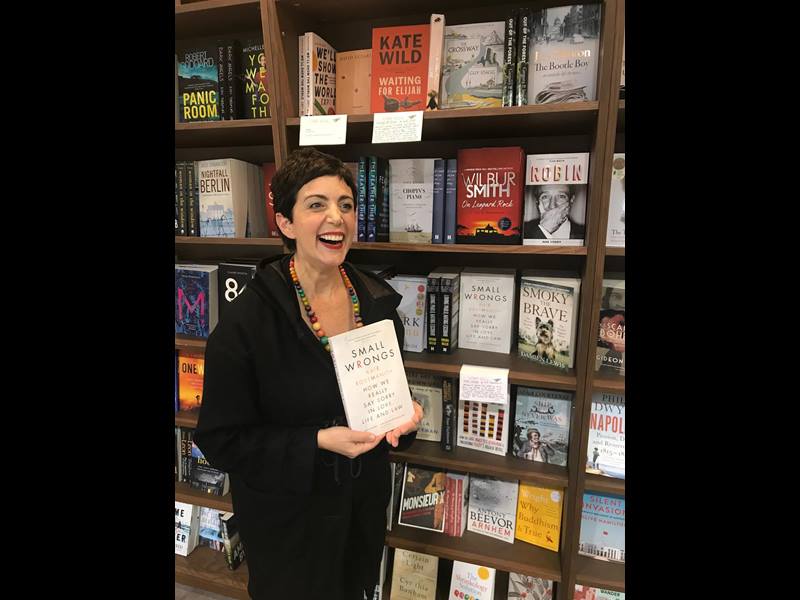Small Wrongs
Q&A with author Kate Rossmanith
22 Jun 2018 | Hardie Grant Books
We recently spoke to author Kate Rossmanith about her new book Small Wrongs, a fascinating investigation into the concept of remorse, intertwined with Kate's own personal story.
Please us a bit about yourself, Kate, and your career so far
I am a nonfiction writer and an academic. I write about memory, enactment and experience. I have written a bunch of essays for The Monthly on topics ranging from stem cell science, to life on parole, to the ways in which people in suburbia live around saltwater crocodiles.
I love conducting ethnography, which involves spending time with people in their living and working environments. Fifteen years ago I completed a PhD in Performance Studies, which is a discipline born of a marriage between theatre and anthropology, and one that examines the ways in which we perform ourselves in everyday life. This has laid the grounding for my recent research into, and writing about, enactments in the courtroom, specifically the demonstration of remorse.
I lecture and research at Macquarie University in Sydney. As well as writing essays, I have spent many years writing scholarly journal articles. This has really forced me to sharpen my thinking.
I turn 45 this year. Small Wrongs is my first book. In terms of trade publishing, in terms of writing book-length creative nonfiction, I’m a mature-age ‘emerging writer’.
Tell us a bit about your new book Small Wrongs
Small Wrongs is about the legal, moral, and personal reality of remorse. It is a meditation on remorse in the criminal justice system and remorse in our ordinary, everyday lives.
Remorse plays a strange role in the justice system. Judges are legally obliged to take a person’s apparent remorse into account when formulating that person’s sentence, and yet how judges assess remorse is unclear. My book investigates this. It draws together performance studies, psychology, theology, biology, and the modern dream of self-transformation to ask: What does it mean to demand an apology from someone? How can you ever know if a person is truly sorry for what they’ve done?
I am interested in hybrid forms of nonfiction. Small Wrongs is a hybrid memoir, weaving together an ethnographic account of the courts with memoir and philosophy. The book is in four sections mirroring an offender’s ‘journey’ through the justice system: Courtroom Appearances, Judgment, Prison & Parole, and Rehabilitation.
How long did it take you to write? What was the writing process like for you?
I researched and wrote Small Wrongs over 8 years. I conducted fieldwork and interviews in the justice system between 2010-2013. I interviewed judges, magistrates, lawyers, police detectives, forensic clinicians, caseworkers, victims and offenders. I sat in on more than 100 court hearings. I attended private meetings of the New South Wales State Parole Authority. I asked people what they thought remorse was, how they assessed it, and what they wanted it to do.
Then I spent the next four years writing and re-writing the book. The project required infinite patience. I have a full-time academic job, so I largely wrote in the gaps, although I was very fortunate to be awarded two 6-month periods of study leave during which I could concentrate on writing.
One of the most challenging dimensions of writing Small Wrongs was finding the voice and structure. This was because there was no obvious ‘story’ as such. In the book I explore the distinction between ‘event’ and ‘background’: how the criminal courts are about event – about cause and effect, about happening, about story – but that mostly we live our lives in background, in the unmarked, the quotidian. I made the technical and creative decision to juxtapose the stories of the courts with accounts/impressions of ordinary domestic relationships. I wrote about a difficult relationship I had with my father; I wrote about a rocky period in my marriage; and I wrote about postpartum depression. I wrote about things that a lot of people – women especially – could relate to. I deliberately avoided writing about any obviously dramatic events in my life. Instead, it was important I explore the ways in which concepts of remorse and morality emerge from average, everyday existence. I wanted to animate the background we live in. I wanted to bring to life the unacknowledged concepts we have about remorse, concepts we then use to judge people coming through the justice system.
What other books are you excited about reading at the moment?
I have just finished Maria Tumarkin’s book Axiomatic. It is brilliant. It is an intense, immersive reading experience in the best sense, a sort of mainline into that magnificent mind of hers. I didn’t want it to end.
Next up I am excited to read Remembering From the Outside: Personal memory and the perspectival mind by Christopher McCarroll.
What’s next for you, Kate?
I am currently working on a project that investigates the surprising ways in which forensic material can be therapeutic for families affected by coronial death. Recently I made a short documentary, Unnatural Deaths, that considers how bereaved relatives view the crime scene photos of their deceased loved ones.
Small Wrongs is being released in the UK in September, so I am heading to London and Scotland later this year to do a number of events there.
Find out more about Small Wrongs here
Book Club notes are also available for Small Wrongs, you can access them here
